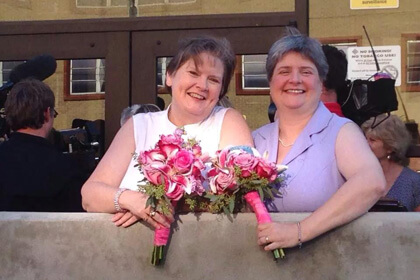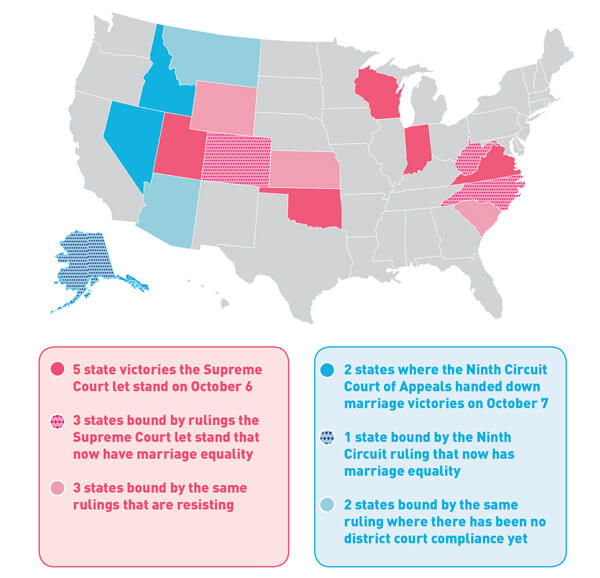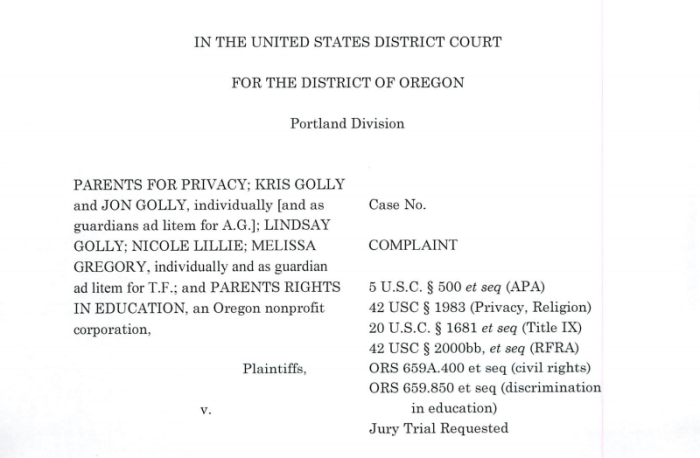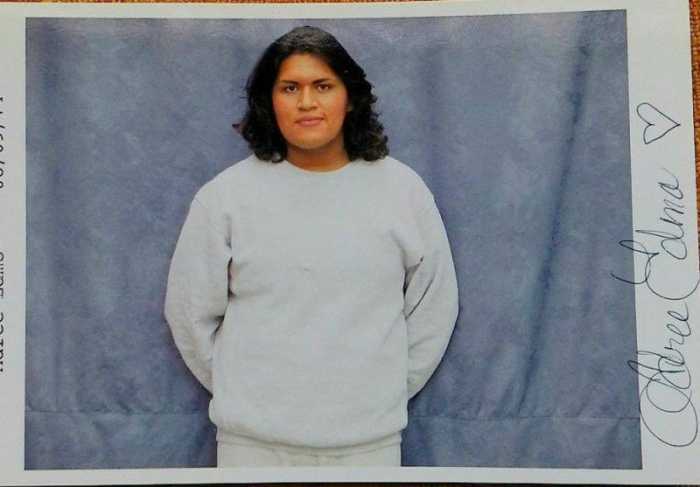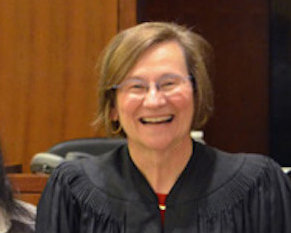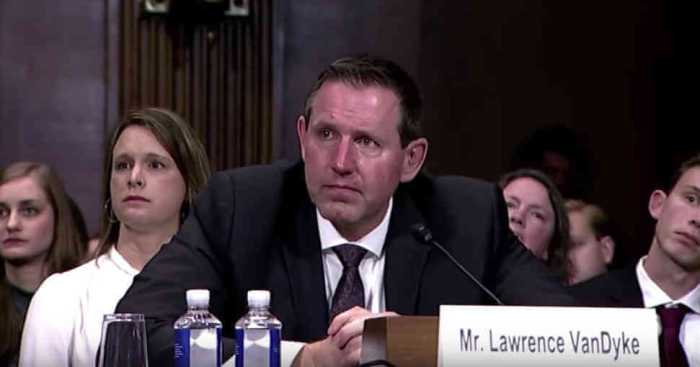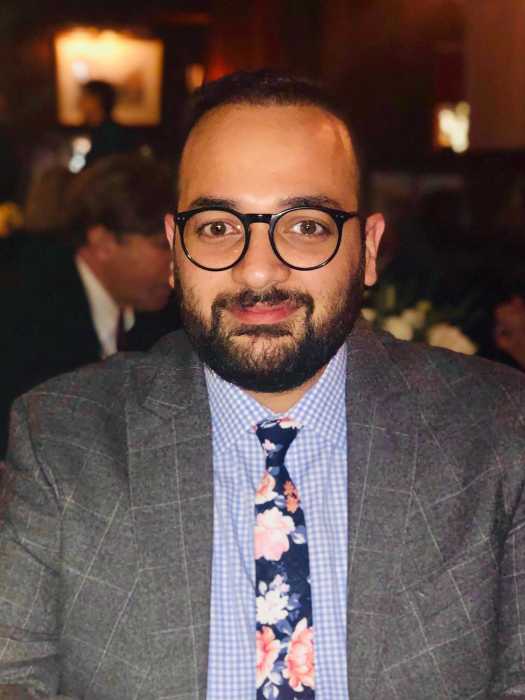Supreme Court Justices Ruth Bader Ginsburg and Anthony Kennedy. | ILLUSTRATION BY MICHAEL SHIREY.
BY ARTHUR S. LEONARD & PAUL SCHINDLER | With lightning speed last week, actions by the Ninth Circuit Court of Appeals and the Supreme Court either upheld or let stand pro-marriage equality rulings in seven states from Virginia to Idaho and also created legal precedents for gay marriage to be extended to another nine states within the appeals court circuits where those cases originated.
Assuming a variety of efforts by states seeking appeals or stays are resolved favorably — and there is good reason to think they will be — same-sex couples in 35 states could have the right to marry within days or weeks. In a 36th state, Missouri, officials will not challenge a state court mandate that out-of-state marriages be recognized.
First to the Supreme Court’s action on October 6, which set the cavalcade of progress in motion. The high court denied petitions for review of appellate court gay marriage victories in Virginia, Indiana, Wisconsin, Utah, and Oklahoma. In these cases, the US Courts of Appeals for the Fourth, Seventh, and 10th Circuits had ruled in recent months that same-sex couples have a 14th Amendment right to marry. Each of those rulings had been stayed pending high court action, and those stays have now been lifted.
Mary Bishop and Sharon Baldwin, plaintiffs in the Oklahoma marriage equality case, marry in Tulsa.MARLIN LAVANHAR/ FACEBOOK.COM
The rulings the high court let stand are now binding precedents in all states under those circuits’ jurisdiction, six of which did not yet have marriage equality. Colorado was the first state to fall in line. The state’s Republican attorney general, John Suthers, who appealed a marriage equality ruling — which was stayed — from the district court this summer, concluded the state was bound by the ruling from the 10th Circuit, which includes Colorado in its jurisdiction. Marriages began promptly.
North Carolina’s Democratic attorney general, Roy Cooper, immediately indicated he would no longer defend that state’s ban. On October 10, a federal district court overseeing ongoing litigation there ordered the state to stop enforcing its policy, and marriages began the same day. The Legislature’s Republican leadership took steps to pick up the mantle of mounting an appeal, but what grounds they could articulate that eluded the five states whose appeals were not taken up by Supreme Court is unclear.
On October 9, West Virginia’s attorney general, Republican Patrick Morrisey, announced the state would have to comply with the Fourth Circuit precedent in the Virginia case, and Governor Earl Ray Tomblin, a Democrat, directed all public agencies to comply accordingly.
The other three states bound by the precedents established in the Fourth and 10th Circuit rulings have so far resisted and the district court judges overseeing litigation there have not yet ruled. In South Carolina, Republican Governor Nikki Haley backed up GOP Attorney General Alan Wilson’s vow to fight on, while Kansas Governor Sam Brownback and Wyoming Governor Matt Mead, also Republicans, led the charge in their states in promising to fight on. (Editor's note: For an update about the October 17 marriage equality ruling in Wyoming, see the longer note several paragraphs down.)
INFOGRAPHIC BY MICHAEL SHIREY & PAUL SCHINDLER
It’s important to remember that the high court’s decision to deny a petition for review is not a decision on the merits. Though unanticipated, the court’s decision to allow marriage equality to go into effect in so many states without ruling may have struck the justices as prudent. Justice Ruth Bader Ginsburg — a likely marriage equality supporter who has already officiated at several same-sex marriages and was part of the majority that struck down the Defense of Marriage Act last year — recently said she saw no urgency as long as there was no disagreement among the circuit courts of appeals.
It takes just four votes to grant review in an appeal. If the four most conservative Republicans — Chief Justice John Roberts and Justices Antonin Scalia, Clarence Thomas, and Samuel Alito — thought they had a chance of picking up the vote of Justice Anthony Kennedy, the DOMA majority opinion’s author, they would likely have voted to grant review in one or more of these cases. The four Democratic appointees — Justices Ginsburg, Stephen Breyer, Sonia Sotomayor, and Elena Kagan — presumably marriage equality supporters based on their DOMA votes, may agree with Ginsburg that there is no need to take up review unless and until a circuit split develops. We may never learn what Kennedy said in the court’s conference two weeks ago to persuade his colleagues to refrain from granting review. It seems a good bet, however, that he gave no hope to the Republicans that they were likely to get his vote.
INFOGRAPHIC BY MICHAEL SHIREY & PAUL SCHINDLER
A day after the Supreme Court’s “decision not to decide,” a unanimous three-judge panel of the Ninth Circuit Court of Appeals ruled in favor of marriage equality in cases from Nevada and Idaho. Writing for the panel, Circuit Judge Stephen Reinhardt, appointed to the court by Jimmy Carter, found the marriage bans fail to meet the heightened scrutiny standard the Ninth Circuit applies in reviewing sexual orientation discrimination claims. The panel upheld a favorable ruling in Idaho earlier this year and overturned a 2012 ruling against marriage equality in Nevada.
Nevada quickly fell into line with the ruling. GOP Governor Brian Sandoval early this year concluded Nevada’s marriage ban was no longer defensible, so the state did not argue on its behalf before the court of appeals, leaving its defense to an anti-marriage-equality group, the Coalition for the Protection of Marriage. The Coalition was allowed to step in when the state backed down from defense of its marriage ban, but it does not have legal authority under Nevada law to further appeal the case.
Idaho was a different story. There, Governor Butch Otter, also a Republican, authorized attorney Gene Schaerr, a Washington-based Supreme Court litigator, to file an emergency application for a stay pending appeal with the Ninth Circuit and with the Supreme Court. Justice Anthony Kennedy quickly granted the temporary stay on October 8. Schaerr’s application said Idaho would seek Supreme Court review and raised two questions — whether heightened scrutiny, a rigorous standard of judicial review, is appropriate in sexual orientation cases and whether bans on same-sex marriage are in fact sexual orientation discrimination. If the Ninth Circuit erred on either point, he argued, the Supreme Court could send the case back to the Ninth Circuit for reconsideration.
Otter’s hopes to buy time, however, were dashed soon enough. Kennedy received the plaintiffs’ response to Idaho’s petition on October 9, and a day later the full court, without comment, denied the request for a longer stay pending appeal. On October 13, the Ninth Circuit ordered that marriages begin on October 15. Otter vows to continue the state’s effort to challenge the Ninth Circuit order.
The Ninth Circuit’s use of heightened scrutiny dates only to this past January, in a case where the court concluded that last year’s ruling in the Defense of Marriage Act case effectively applied that standard by placing the burden on the federal government to justify its unequal treatment of legal same-sex marriages. Reinhardt did not offer a view on whether the marriage bans met the more customary and lenient standard of exhibiting at least some rational basis.
The high court’s refusal to grant Idaho officials a longer stay in pursuing an appeal is likely a relief to LGBT legal advocates. The state pointed out that heightened scrutiny was a different standard that those used in the other appellate rulings the Supreme Court let stand, a hook that could have led the high court to treat the Ninth Circuit differently.
Action in response to the new Ninth Circuit precedent came quickly in Alaska, where District Judge Timothy M. Burgess, in a surprising Sunday ruling on October 12, issued an immediate injunction barring enforcement of the same-sex marriage ban there. Republican Governor Sean Parnell has vowed to fight the ruling, but license applications began to be accepted the following day. (Editor's note: After this story was published in print, a panel of the Ninth Circuit granted Alaska a stay until noon on October 17 to give them time to seek a longer stay from the Supreme Court pending appeal. Last week, the high court refused to grant Idaho such as stay. The high court declined to grant that stay, opening up same-sex marriage in Alaska again. Meanwhile, also on October 17, federal judges in Arizona and Wyoming ordered those states to grant same-sex couples the ability to marry. The Arizona order was made without any stay, and the attorney general there said an appeal would be useless. In Wyoming, the order was stayed to give state officials the opportunity to appeal. A day earlier, however, Governor Matt Mead, who had vowed to continue fighting against marriage equality in his state said, during a campaign debate, that appealing a marriage equality ruling from the district court would not be worthwhile. )
Unlike the Ninth Circuit, Burgess essentially found that the state’s ban failed to satisfy even a more lenient, deferential standard of review, writing, “Alaska’s same-sex marriage laws are a prime example of how Ôthe varying treatment of different groups or persons is so unrelated to the achievement of any combination of legitimate purposes that we can only conclude that the legislature’s actions were irrational.’”
Burgess, appointed to the high court by President George W. Bush in 2005, also rejected the state’s argument that the plaintiffs were seeking a “new” constitutional right of “same-sex marriage,” finding instead that at stake was what the Supreme Court has repeatedly identified as a fundamental right to marry, one the high court has never limited, he said, to “the particular facts of the case before it or [found to be] a right belonging to a particular group.”
The two other states impacted by the Ninth Circuit ruling have so far been quieter. In Arizona, a district court has given state officials until October 16 to offer a counterargument to the presumption the ruling overturns the same-sex marriage ban there. No timing has been established for district court action in Montana.
INFOGRAPHIC BY MICHAEL SHIREY & PAUL SCHINDLER
Still to be heard from is the Sixth Circuit, where the court of appeals heard oral arguments on marriage victories in all four states under its jurisdiction — Michigan, Ohio, Kentucky, and Tennessee — early in August. Observers of those arguments had predicted this might be the first circuit to rule against gay marriage, but the Supreme Court’s action might influence the judges’ thinking, especially given the lack of any dissent from an action that opened up marriage equality in 11 more states.
In the Fifth Circuit, the court has yet to schedule arguments on appeals from district court rulings in Texas and Louisiana, though those are widely expected in November. In the 11th Circuit, that court has also not scheduled arguments on Florida’s appeal from a trial court pro-marriage equality ruling.
The State of Missouri last week announced it would not appeal a state judge’s order that it recognize valid marriages from other jurisdictions. Earlier this year, a state judge in Arkansas struck down the gay marriage ban there on federal constitutional grounds, in a ruling that was stayed. Both states are in the Eighth Circuit, where Iowa and Minnesota already allow gay and lesbian couples to marry, but where no federal court rulings have come down. The Eighth also includes Nebraska and North and South Dakota.





